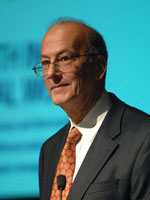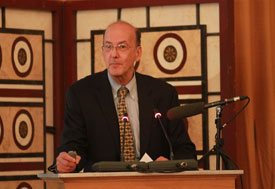Building a health care workforce in Africa with MEPI
September / October 2012 | Volume 11, Issue 5
Opinion by Dr. Roger I. Glass
Director, Fogarty International Center
It's a shocking pair of WHO statistics: that Africa shoulders a quarter of the world's disease burden yet claims only 3 percent of the global health care workforce. We're working to change that. By linking Africa's medical schools and transforming health science instruction, we're improving the quality and quantity of doctors and health care workers available across the region.
It's uplifting to witness the incredible progress made in the two short years since we launched our Medical Education Partnership Initiative (MEPI), which we co-administer with the Health Resources and Services Administration. Our funding partners - the President's Emergency Plan for AIDS Relief and more than a dozen NIH Institutes and Centers - gathered with MEPI grantees recently in Ethiopia to review the extraordinary advances made so far. (See the related article Africa transforms its medical education with MEPI.)

Dr. Roger I. Glass,
Director of the Fogarty
International Center
By awarding these substantial grants directly to African institutions in 12 countries, we're empowering them to take ownership and responsibility to develop lasting resources that will improve the region's health care for decades to come. We're encouraging MEPI partners to link together medical schools, remote health training sites and other related organizations, to leverage resources and expand capacity so quality care can reach more of their people, especially in the rural areas, where it's needed most.
These awards are already proving to be catalytic, igniting enthusiasm among national governments that has sparked the creation of new medical schools, rural training sites and, most significantly, pledges of financial support that will ensure these efforts are sustainable. Through unprecedented engagement with ministries of health, education and finance, MEPI grantees are aligning program goals with country health needs and priorities.
Through MEPI, medical schools are developing plans to train multidisciplinary teams equipped to solve their country's most pressing health problems, whether they're HIV/AIDS, other infectious diseases, or areas that need special attention such as maternal and child health, surgery and cardiac care. Well-qualified physicians, surgeons, engineers and other specialists all play a vital role in health care and biomedical research. Chronic diseases are now the leading cause of death and disability in the developing world and it is vital Africa is prepared for the challenge.

Courtesy of the MEPI Coordinating Center
Fogarty Director Dr. Roger I. Glass addressed a
recent MEPI gathering in Ethiopia.
Some schools are using MEPI support to expand instruction in the emerging field of implementation science - the study of how to move discoveries into practice. I am particularly delighted at this, since Fogarty has championed this critical aspect of research, sometimes referred to as a way to reduce the "know-do" gap.
It's exciting, also, to witness the sea change underway in the use of technology in medical education. Whether they're improving Internet access, adding online journals to their digital libraries, or implementing videoconferencing and other e-learning technologies, MEPI grantees are weaving technology into every aspect of their programs. Now it's possible for a nursing student at a remote rural outpost to virtually attend a Grand Rounds lecture by the world's foremost authority on a topic of great relevance to the community she serves. The opportunities for knowledge sharing are truly astonishing.
These developments will make it possible for students and professors to stay abreast of the latest discoveries and techniques. That's one way MEPI grantees hope to recruit and retain well-qualified faculty. Medical schools are also establishing research career tracks so that faculty can have protected time and resources to conduct studies. This not only helps tether them to their positions but also produces a body of local research to inform health policy decisions. Research, training and service have a symbiotic relationship - each improves the quality of the whole.
I was pleasantly surprised and encouraged by the degree to which MEPI grantees have already begun to gel as a group. By sharing successes and challenges, they can better leverage resources and increase their impact. In time, I hope that Africa will have a self-sustaining health sector that is fully able to handle the continent's immense health needs. MEPI will be part of this future.
More Information
To view Adobe PDF files,
download current, free accessible plug-ins from Adobe's website.